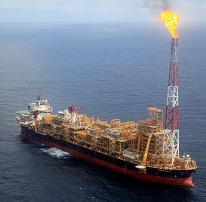
It is not a nuclear reaction – not yet!
When three major players in one industry, all announce substantial shifts in strategy and/or focus in a very short span, it signals a fundamental change in the underlying assumptions. These past two weeks saw one surprise after another as first Extract Resources, then Marenica, and finally Areva announced a dramatic turn in their strategies which probably points to a change of heart and a significant reappraisal of prospects and strategies.
The Australian miner, Extract Resources runs a local subsidiary, Swakop Uranium, which is the owner of the EPL that covers the so-called Rössing South deposit. From extensive exploration work and a range of assays, Extract has claimed this deposit has the potential to turn into the fourth biggest uranium mine in the world. And the Aussies should know – they are the leading uranium mining and production country. But it caught them unawareness when their biggest consolidated shareholder, Kalahari Minerals, announced they have received an offer from a Chinese company. This is the first public indication that Chinese mining concerns have their sights on uranium production in Namibia.
Earlier this week Areva made the announcement that every informed mining analyst was expecting for some months: The Trekkopje operations will be shut down. Areva also announced the shut down of their South American, West African and South African operations. In a comprehensive statement released only Thursday, Areva says it will reconsider its entire uranium operation conducted under Uramin. While the statement is full of legalese and mineralogical terminology, the message it conveys is that Areva has lost money by the billions and is forced to reconsider and reconsolidate its financial position before re-opening any of their uranium operations. The overall tone is negative.
Marenica released a SENS in Australia on Wednesday echoing much the same sentiments as the Areva statement. Also convoluted in the extreme, this statement makes detailed comparisons of the projected cost per pound of uranium in the ground versus the expected uranium spot price in the market. By their own assessment, margins appear marginal, and I gathered from Marenica’s words, they are also taking a step backward to re-appraise their involvement in uranium exploration in Namibia.
After Fukushima, suddenly the expected darling of local mining investment, has turned into a pariah. Both the Areva and Marenica statements refer to events after Fukushima, highlighting the uncertainty that has entered the industry since the nuclear disaster in Japan.
This is where the Extract Resources statement differs markedly from the other two. I get the impression the Extract board is peeved because they were not privy to the discussions their biggest shareholder had behind their backs with a Chinese company. But the Taurus offer at least contains some consolation for the Aussies. It promises to make them an offer at a later date provided they can get control of Kalahari Minerals. The Extract board’s biggest concern, according to what I read between the lines, is to ensure they get as much buck for their bang, as is possible. In the meantime, several statutory periods have to elapse before the Taurus (Chinese) Kalahari Minerals (British) deal becomes reality and only after that will the Taurus / Extract deal be put on the table.
The reality for us is that the expected change in ownership of our richest uranium deposit can delay the commissioning of the mine for up to a year. I cannot see how Extract will continue with mine development as long as there is a 50% + voting rights condition in the first transaction, and a formula that has already been published for calculating the value of the rest of Extract. Determining the value of Extract can turn into a major obstacle if the Extract board sticks to its stated intention of making sure their shareholders get the best value.
But as an analyst I also have to consider the possibility that were it not for the Chinese offer, an Extract statement may have followed the same tenor as the other two. Perhaps it is a case of both Kalahari Mineral and Extract Resources taking what they can get and opting out of an industry that is fast turning into a lame duck. I do not know this for a fact but margins in the uranium industry are certainly under pressure and I believe there are more people than just myself that have noticed this.
Then again, it also points clearly to the Chinese government’s determination to continue with its nuclear to energy programme and that by obtaining control over a mine in Namibia with the potential to became a world-class mine, they are ensuring the sustainability of their own energy scenario. And that scenario will be biased towards nuclear energy.










































